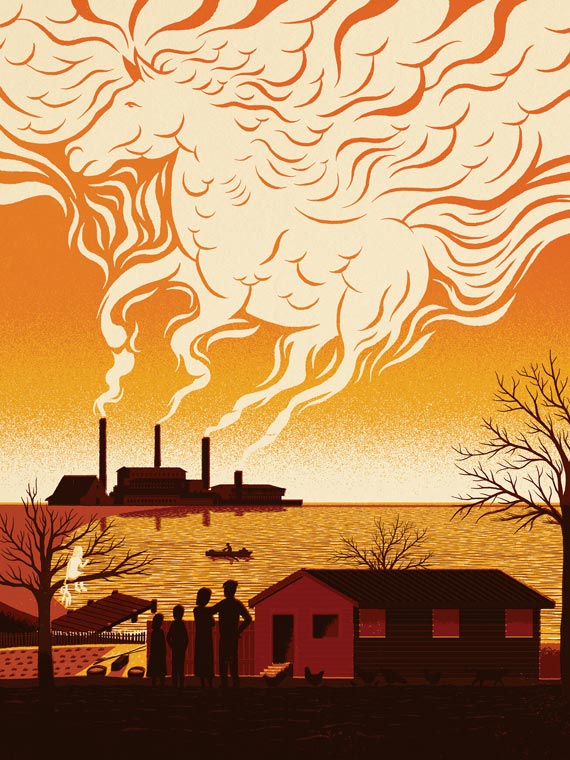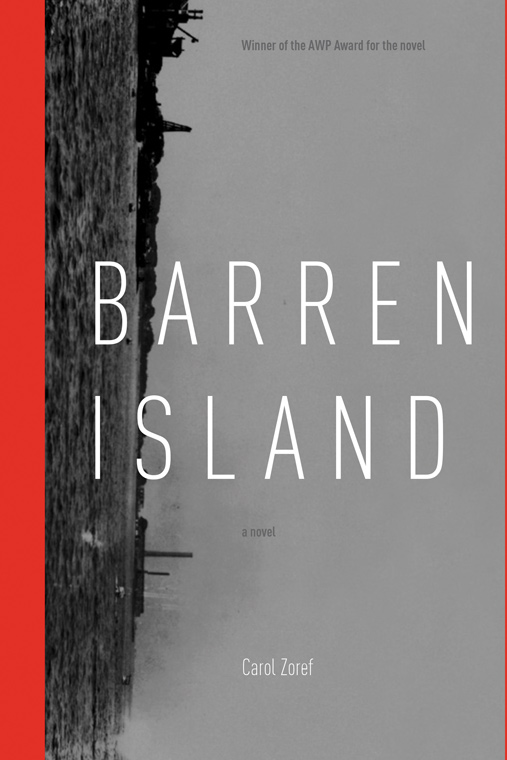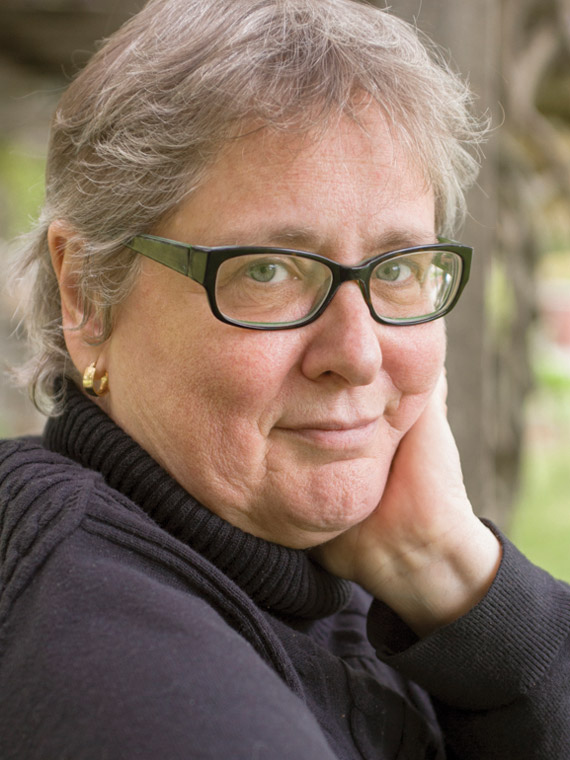How does one remember a world that no longer exists? Told by Marta Eisenstein Lane on the occasion of her 80th birthday, Barren Island is the story of those who lived and labored on a factory island in New York’s Jamaica Bay, where dead horses were rendered into glue and grease from the mid-19th century until the 1930s.

Ask about the smell. That is what everyone asks no matter who or why or where they might be. It is the detail they want most when they hear about the horses and dogs and pigs that filled the barges; about the wake of stench when the meat markets closed for the day and the surgeries closed for the morning and the rest of New York paused in coffee shops and automats, in lunchrooms and kitchens and union halls, on curbsides and at cleared-away corners of the cutting tables in the garment factories on 39th Street to eat sandwiches made from animal parts, the ones that would not be burned that day on Barren Shoal.
Cow bone, pig bone, sheep bone, horse bone. Chicken bone, turkey bone, dog bone, cat bone. Maggot-covered cow skins, postulated hog snouts, ulcerated sheep hides, abscessed horse heads, festering dog tails, cat jaws. Wet smells settled in the creases of human skin, rose like cruel heat across the harbor, lingered on the silent curls of factory smoke. They were smells one could touch, a gummy scrim over every breathing hour. Fleas, flies, snakes, worms, beetles, lice, mites, ticks, mold, mildew, and fungus gorged on the smells that not even the furnaces on Barren Shoal burned away.
My family lived on Barren Shoal for 25 years, my father glad to have work to keep us clothed in something better than the rags that the pickers scavenged and stitched and salvaged and wore and sold and traded and wore down into rags again. Bones became glue, thread became cloth, and in the end, everyone was different and everyone was unchanged.
About things such as these, an 80-year-old woman like me, Marta Eisenstein Lane, of sound mind and in full possession of her senses, should know.
My parents came to Barren Shoal in 1914 after who knows how many days at Ellis Island and six weeks of exhausted, listless sleep on the benevolent floor of Aunt Sara and Uncle David’s one-bedroom apartment in Borough Park. My cousin, Flat Sammy, born eight months earlier, wailed every hour of every one of those weeks, a protest against the mean circumstances of his life. Sara, my father’s sister and only living relative, had been kicked in the stomach by a coal-cart horse gone crazy three weeks before her delivery date. She was carried upstairs just in time for Sammy to arrive through a confusion of spasms, his soft, fetal head irreparably misshapen. The horse, still hitched to the coal cart and having spasms of its own, dropped dead on the cobblestone, saliva rolling from its jaw like the blistering scum on a pot of boiling soup.
The coal horse, like every dead horse in New York City, was carried that night by barge to either Barren Island or Barren Shoal, where it was butchered and boiled down for glue and grease. Flat Sammy—that is what we called him on account of the horseshoe-shaped dent on the back of his head and so as not to confuse him with Uncle David’s brother who lived in Philadelphia, also named Sam—Flat Sammy did not die. Flat Sammy survived for no reason except that most of us die in pieces, not all at once. Even the horse that kicked Aunt Sara.
Wet smells settled in the creases of human skin, rose like cruel heat across the harbor, lingered on the silent curls of factory smoke.
I have examined the history books and public documents, have read how the first garbage barge arrived at Barren Island, the bigger and nearest neighbor to Barren Shoal, in 1852. I have learned how before the word was anglicized, the Dutch called it Beeren Island for the bears they believed lived there feeding off fish and clams and crabs, though there is no record, official or anecdotal, of any Dutch settler ever sighting a bear among the pine stands and sage and white sand beaches of the islands in Jamaica Bay.
For who-knows-how-long prior to the Dutch and their imaginary bears, the Native Americans called this place by their own word, Equindito, meaning Broken Lands. It was a name that was custom fit to the small islands it contained. One of the smallest, sandiest pieces was our own small island, the flat and forsaken Barren Shoal, separated from the better-known Barren Island by the merest of shallows at low tide and a few feet of water when the tide was high. Most of the natives who lived on Equindito were massacred by Dutch settlers, who chased away the survivors who did not die. This does not change the fact that Equindito was their home for a time that mattered, meaning any amount of time at all.
The last public garbage incinerator on Barren Island, according to the city records, was closed in 1918; the last glue factory, in 1933. But that was Barren Island, not Barren Shoal, about which there are no records. Not even my grandson Eric, the anthropologist, has had any luck with finding out more than I, and he knows how to find things better than anyone.
Today, on this very day, if someone searches for Barren Shoal on a map, they will come up empty-handed. If their interest outweighs this disappointment, they might search an atlas dating back a century or so. If they are anything like Eric, our homegrown scholar, they might sift through the New York Municipal Archives, laying their hands on once-important documents that no one has touched in years. If they are thorough—or lucky—they will come upon the name “Barren Island” in the disintegrating tax records, land grants, and minutes of the meetings of the old Common Council or the City Committee on Planning and Survey. But they will not find a single word about Barren Shoal. They can nose around the Port Authority of New York & New Jersey and will have no more luck finding Barren Shoal than they would finding the places where the government buries its unwanted uranium, hoping that we will forget.
Believe what you will. Everyone does. The fact that every trace of Barren Shoal is gone does not mean it was never there.
✱ ✱ ✱
In the very beginning of his very first days in America, my ever-hopeful father accompanied Uncle David to Manhattan, where David had a job cutting fabric for men’s shirts. My father was waiting for someone to lead him somewhere, looking for a place where a man with no English could earn a wage. My father kept close by Uncle David, his center of gravity still rocking from the journey across the Atlantic.
The wooden floor of the factory hummed and droned, my father would later recall, with vibrations from row after row of sewing machines. There were scores of them—a choir of foot-pedaled Singers. A voice rose above the chorus: “You!” That is how it all began, my father would say when he told this story. “You!” flying bullet-like from a thin man in a white shirt with a blue tie and darker blue trousers. “You,” my father would boom, exaggerating the thin man’s trembling baritone. He told the story in English for the sake of my siblings and me, even though everyone at the factory spoke in Yiddish.
“Sort these,” ordered Mr. Gretzky, Uncle David’s boss, as he rolled a laundry hopper across the cutting room. My father threw out his arms to stop the hopper from crashing into him and Uncle David, who was hovering at his cutting table over a bolt of white pima cotton, persuading it to yield gracefully to his scissors.
“What’s he telling me?” my father asked Uncle David, whisper-shouting over the noise of the factory floor. The palms of his hands stung where the wood frame of the bin had smacked into them. He wondered if Mr. Gretzky had mistaken him for someone who worked there.
Inside the hopper were scraps of fabric discarded by the cutters, who were scissoring out arms and backs and pockets and collars for men’s shirts or ladies’ blouses. Why one is called one thing and the other called another is one of those mysteries, like the difference between slacks and pants and trousers. I know: I digress. But the mind must be allowed to wander so it can remember. Forgive me.
“Pull out the pieces big enough for rags,” instructed Uncle David, looking up from the sleeve he was cutting. “Gretzky pays by the pound. He sells them to a ragman. The more efficient I am as a cutter, the less you make, so forget about me and go pick up after the others.” My uncle rotated the fabric he was working and waved his scissors in the direction of the other cutters.
My father was waiting for someone to lead him somewhere, looking for a place where a man with no English could earn a wage.
My father, who was a shoemaker, knew nothing about clothing. He had been trained by his own father in Zyrmuny, in the room on the side of their house that was a repair shop. Factories were the stuff that cities like Babruysk and Minsk were made of, not muddy shtetls like Zyrmuny. The Industrial Revolution went right by Zyrmuny until the Germans built a death camp at Maly Trostinec, if you do not mind my saying so. Plenty of people say I should stop already. Enough already. Soon. Soon enough I will stop forever.
On 39th Street, however, the International Ladies Garment Workers Union, the ILGWU, had already organized two factories in the same building.
“Are they communists?” asked my father.
“Sentimentalists,” said David. “Socialists gone mainstream.” He looked to see who might be listening. “Later, when you and Rachel get settled, we’ll go to a meeting. See for yourself.”
“If later ever comes,” said my father, still exhausted from the ordeal of getting from Zyrmuny to Borough Park.
My father might have been sorting scraps forever, might have even worked his way up to becoming one of Mr. Gretzky’s cutters, had he not one day said a few words to the driver of the rag cart about needing a room that he and my mother could rent, things being so crowded with my aunt and uncle and cousins. The driver said something about there being better sorting jobs somewhere else in New York, a place where they gave a man a job and a house and the people walked to work. And how, if my father slipped him a bin of rags that also contained an unspoiled, uncut bolt of cloth, the driver would be certain to get my father an introduction.
My father punched the ragman across the jaw. “You think I’m an animal that would steal for you? Maybe get arrested? Get deported?”
“Are you crazy, Sol?” cried Uncle David, who had been waiting for my father so they could begin the subway trip home.
The startled ragman, still stunned, crawled out of the scummy puddle he had fallen into. He wiped his bloodied lower lip with a rag that he then buried back in his cart. To their astonishment, the ragman introduced my father and uncle to a man at the reins of the next cart over. “You deserve it, you filthy, greenhorn, sons-of-a-bitches Yids,” the ragman yelled as he rode off.
“You’ll never get out of there,” cried Aunt Sara that evening when she heard the news about the job on Barren Shoal. She was shaking her head and weeping, and soon Flat Sammy was wailing in unison. My father tried distracting Sammy with a hand puppet he fashioned from a sock, hoping that Sara would get distracted too.
“The stench there is poison,” cried my aunt, who was my father’s oldest sister. “The smell of it will kill you, living out there like an Italian, sorting through garbage.”
“It’s a factory job, Sara. And a place to live.”
“We smell that place in the summer when the wind blows. Fheh! The cows in the Queens, they stop giving milk. The rich people complain up on Carnegie Hill. I know this; one of the ladies in our building, Mrs. Aryeh, does sewing there.”
“On Barren Island?” asked my uncle.
“Carnegie Hill,” my aunt replied.
“This isn’t Barren Island,” said Uncle David. “It’s another place: Barren Shoal.”
“Did you wake up today stupid? It’s called Barren because nothing grows there,” she went on.
“Let it go, Sara,” shouted Uncle David, who was now cradling Flat Sammy like an oversized doll too large to tuck completely into his lap.
“There’s no going back and forth so easy,” she shouted in return, “no subway to the incinerators. You go, you’re gone.”
“Enough, Sara,” said my father. “You’ll see us plenty.” He took Flat Sammy from my uncle’s arms, kissed the flat of his head, and stroked the back of his neck with the hand puppet.
Five days later my parents went to live among the 20 other families on Barren Shoal.
Written by Carol Zoref ’76, MFA ’97 (Writing)
Illustration by Sam Brewster
Adapted from the novel Barren Island, © Carol Zoref. Published by New Issues Poetry & Prose / Western Michigan University. Reprinted by permission of the publisher.
Carol Zoref ’76, MFA ’97 moved to New York City after college to work as a writer/editor of photography magazines. Her next stop was a communications firm, where she specialized in writing about photography and electronics. Her final stop in the private sector was at a family-owned professional photographic laboratory, where she continued working full time after returning to SLC for graduate school. After receiving her MFA, she entered academia, teaching creative writing at The New School, Parsons School of Design, and New York University. Now director of The Writing Center at Sarah Lawrence, she also taught undergraduate courses at the Center for Continuing Education for many years. Her essays and poems have been published in literary magazines and national newspapers, ranging from the Bellevue Literary Review to The New York Times. She has received fellowships, awards, and research grants from NYU, Virginia Center for Creative Arts, Hall Farm Center for the Arts, In Our Own Right, and more. Barren Island received the 2015 AWP (Association of Writers and Writing Programs) Award for the Novel.
Photo by Quyen Nguyen


